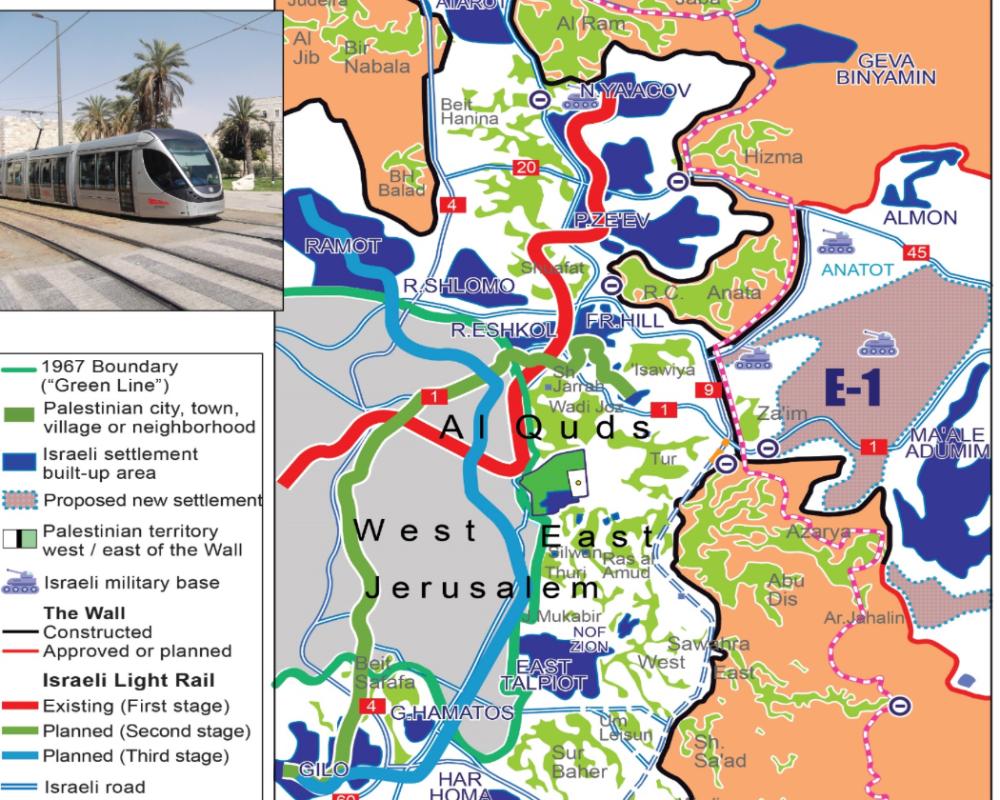
RAMALLAH, West Bank /PNN/
As Israel begins a major infrastructure phase of its Jerusalem Light Rail (JLR) project this week, Palestinian officials are raising alarms over the involvement of international corporations, particularly Spain’s Construcciones y Auxiliar de Ferrocarriles (CAF), in what they describe as efforts to entrench Israeli settlements in occupied East Jerusalem.
The 14-week construction phase, set to begin May 21, aims to connect the existing Red Line to the Green Line, expanding service between West Jerusalem and a number of Israeli settlements in East Jerusalem and beyond. The project has drawn sharp criticism from the Palestinian Negotiations Affairs Department, which argues that the rail system is being used as a tool to consolidate Israeli control over occupied territory.
Project Scope and Expansion
The JLR, a long-standing Israeli initiative, was initially designed to link West Jerusalem with settlements such as Pisgat Ze’ev and French Hill. The second phase of the project will extend connections to the Gilo and Neve Ya’akov settlements and to the Hebrew University in Mount Scopus. A future third phase plans to link Gilo to Ramot via a new Blue Line, all within or adjacent to East Jerusalem — territory considered occupied under international law.
The Spanish firm CAF, in partnership with Israel’s Shapir Engineering and Industry, formed the TransJerusalem J-Net consortium, which won a €1.8 billion contract in 2019 to expand and operate the light rail network. The project includes construction of 27 kilometres of new track, development of 53 stations, and the procurement and refurbishment of more than 150 tram units. CAF holds a 50% stake in the company operating the system.
Legal and Political Implications
Palestinian officials say the light rail is not merely a transportation initiative but a strategic move to physically integrate Israeli settlements with West Jerusalem. They argue the project undermines the feasibility of a two-state solution and violates international humanitarian law by altering the status of occupied territory without serving the needs of the Palestinian population or fulfilling any legitimate military necessity.
“Israel, as the occupying power, has no sovereign rights over East Jerusalem,” the department said in a statement. “The JLR contributes directly to the de facto annexation of the city and fragments Palestinian neighbourhoods, isolating them from one another and from the rest of the West Bank.”
The United Nations and several international bodies have repeatedly declared that Israeli settlement activity in East Jerusalem is illegal and an obstacle to peace.
Corporate Complicity
The Palestinian Authority accuses CAF of complicity in these violations, urging the company to reconsider its participation in the project.
The criticism comes despite Spain’s decision in May 2024 to recognise the State of Palestine — a move hailed by Palestinian leaders as a principled stand for international law and human rights.
“CAF’s continued involvement directly contradicts the Spanish government’s position and undermines the broader international consensus on East Jerusalem,” the Negotiations Affairs Department said.
The department called on CAF and other international actors to align their business practices with international legal norms and their governments’ official policies, warning that corporate involvement in such projects risks entrenching the occupation and legitimizing illegal settlement expansion.
It’s worth noting that East Jerusalem, captured by Israel in the 1967 Mideast war and later annexed in a move not recognized internationally, remains a flashpoint in the Israeli-Palestinian conflict. Palestinians seek East Jerusalem as the capital of a future independent state.
The expansion of Israeli infrastructure into the area, including roads, housing, and now light rail, is seen by Palestinians as part of a broader strategy to alter the city’s demographic and political landscape.
“This is not about public transport,” the statement concluded. “It is about making the occupation permanent.”
Third State Obligations with respect to the JLR
The involvement of international corporations, particularly the CAF, in the JLR project raises serious legal and ethical concerns, amounting to complicity in violations of international law. Such involvement stands in stark contrast to the principled position adopted by the Government of Spain in May 2024, when it officially recognized the State of Palestine.
Spain’s recognition was not only a historic and courageous step, but also a clear affirmation of its commitment to a rules-based international order grounded in respect for international law, human rights, and the inalienable right of the Palestinian people to self-determination. The decision sent a strong political message in support of ending the Israeli occupation and upholding the two-state solution, with East Jerusalem as the capital of the future Palestinian state.
Spain’s position has also served to strengthen the international consensus rejecting the legitimacy of Israel’s unilateral actions in the occupied Palestinian territory, particularly its attempts to alter the legal and demographic character of East Jerusalem through settlement expansion and annexation measures. By taking a public stand, Spain contributed to reinforcing international legal norms and encouraging other states to take concrete steps in defense of Palestinian rights.
In light of this position, it is imperative that CAF act consistently with the principles underlying their government’s policy.